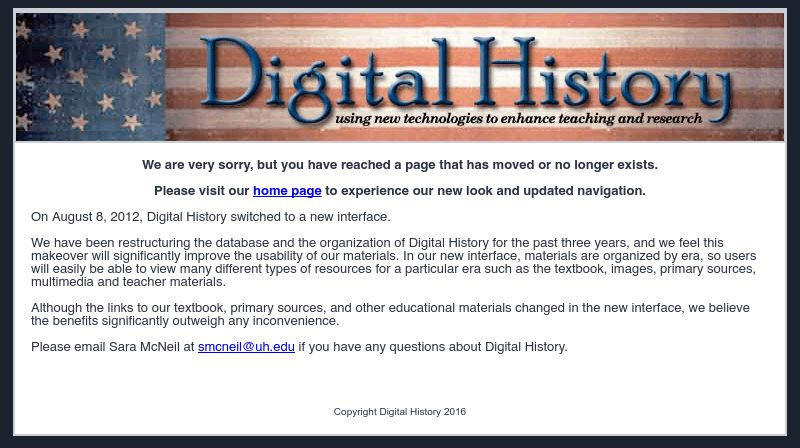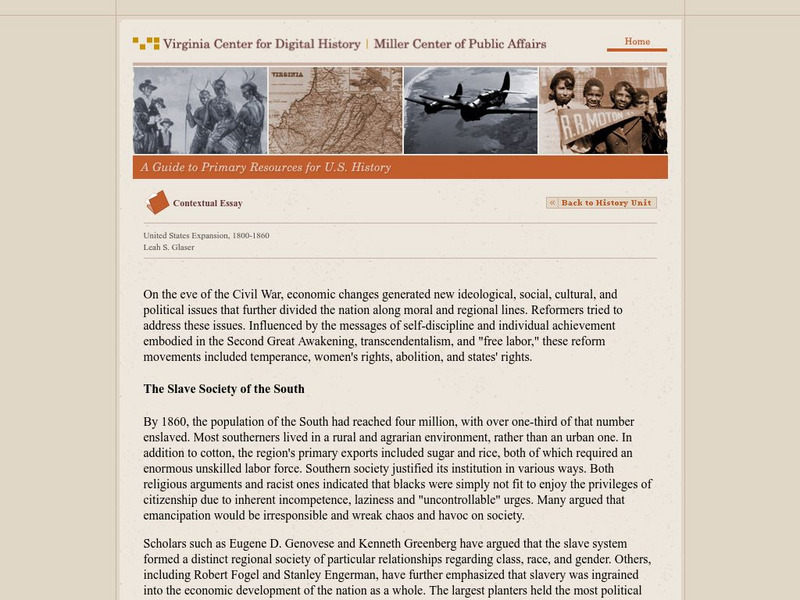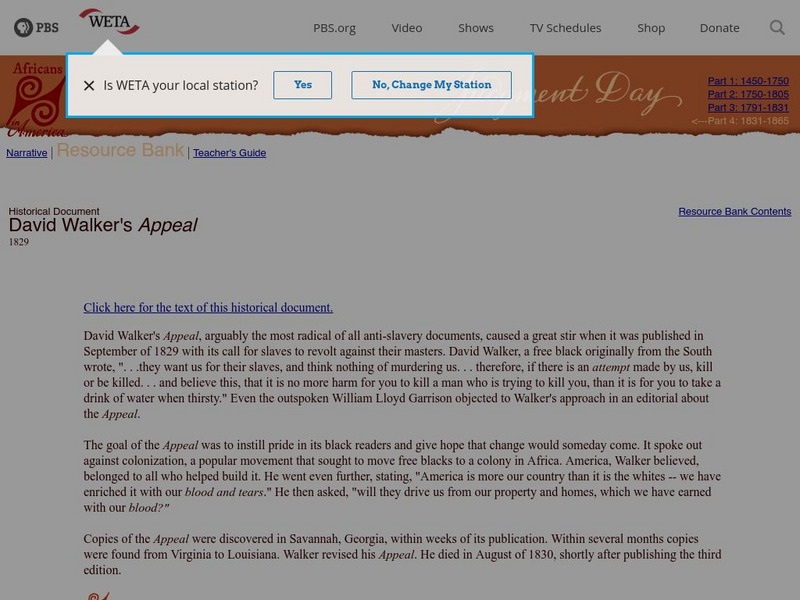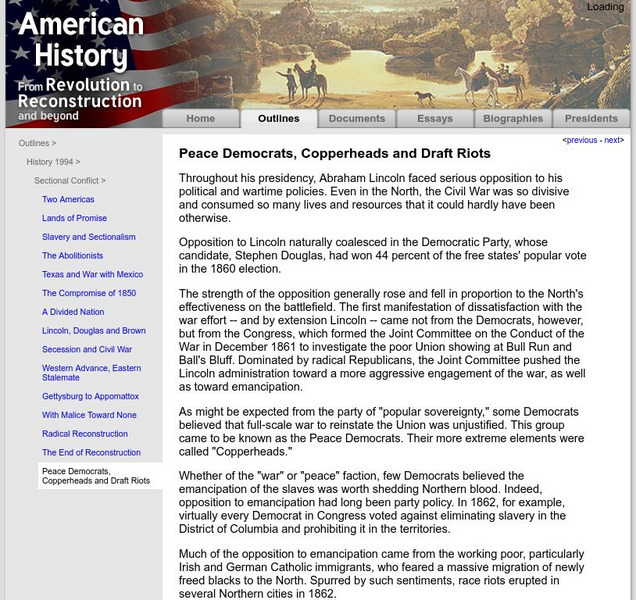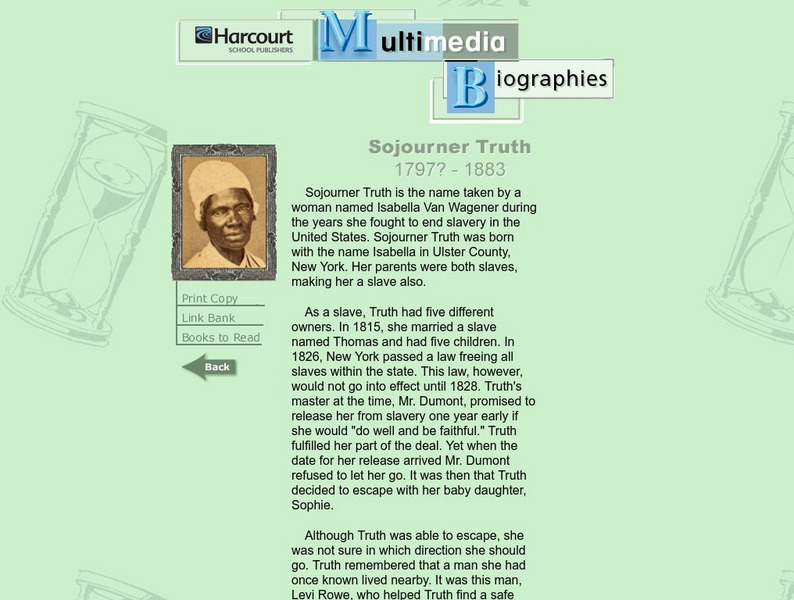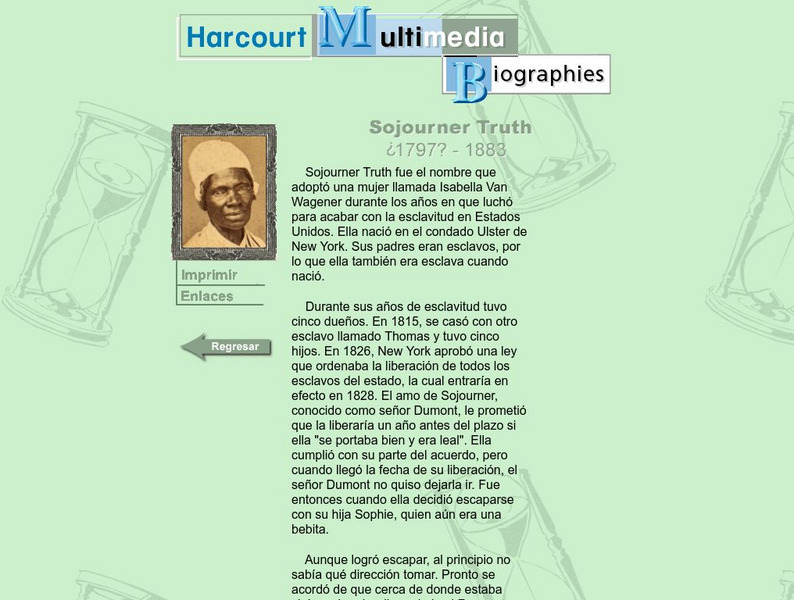Curated OER
Abolition Celebration in Washington, d.c.
This site provides several maps which depict the slave states and the free states. There are links that will connect you with an abolitionist song and information on John Brown.
Curated OER
Anti Slavery Banner for the Promotion of the Immediate Abolition of Slavery
A five-part article describing the British antislave trade movement. All major figures in the abolition movement discussed.
Digital History
Digital History: Radical Reform and Antislavery
Find a comprehensive history of the anti-slavery movement and how it fit into the larger reform movements of the first half of the 19th century.
Other
19th C. u.s. Women's Writings: Lydia Maria Child's "Slavery's Pleasant Homes"
Text of several of Lydia Child's writings that supported her abolitionist sentiments.
Understanding Slavery Initiative
Understanding Slavery Initiative: Emancipation
Although the British Parliament passed the Abolition of Slavery Act in August 1833, the trade continued, and for many years there were exceptions to abolition. Learn how the British government attempted to prevent the slave trade from...
BBC
Bbc History: British History: Empire: British Anti Slavery
A five-part article describing the British antislave trade movement. All major figures in the abolition movement discussed. Archived.
British Library
British Library: Discovering Literature: African Writers and Black Thought in 18th Century Britain
This article describes how four writers, taken from Africa as children and sold into slavery, grew up to write works that challenged British ideas about race, called for African brotherhood, and demanded the abolition of the slave trade.
Other
Online Archive of 19th Century u.s. Women's Writings: Emancipated Slaveholders
Writing in the 1840s, Lydia M. Child tells the story of ex-slavers living in Virginia. Demonstrates the complexity of the abolition debate in Pre-Civil War America.
British Library
British Library: Abolitionist Campaigners
A collection of short biographies of individuals who were involved in the anti-slave trade movement in England during the late 18th and 19th centuries.
PBS
Pbs: Africans in America: David Walker (1796 1830)
At this site from PBS you can read about the life of David Walker. Born in the late 18th century as a free black, he was most known for his pamplet, entitled "Appeal," which advocated slave revolt.
National Humanities Center
National Humanities Center: Toolbox Library: Sierra Leone, Making of African American Identity: V. 1
An eighteenth-century map, several illustrations by Europeans of Africans from Sierra Leone, and two eighteenth-century narratives depicting Sierra Leone natives through the eyes of two British physicians who describe the peoples they...
University of Virginia
Virginia Center for Digital History: United States Expansion, 1800 1860
An essay that looks at issues affecting Americans leading up to the Civil War. These included economic changes that led to new ideological, social, cultural, and political issues that further divided the nation along moral and regional...
Columbia University
Columbia University: Columbia University & Slavery 7. Columbia Faculty
This website was created by faculty, students, and staff to publicly present information about Columbia's historical connections to the institution of slavery. This article discusses the connection between Columbia's faculty to slavery....
PBS
Pbs: Cet: Africans in America: David Walker's Appeal
A description of the impact of David Walker's "Appeal" calling for slaves to revolt. Click on the link to read the original text. Click on Teachers Guide for teaching resources
Read Works
Read Works: Sojourner Truth, 1864: A Primary Source
[Free Registration/Login Required] ReadWorks features a primary source from the Gilder Lehrman Institute of American History. The primary source features the emancipated slave named Sojourner Truth who worked as an abolitionist and...
Black Past
Black Past: Toussaint L'overture
This encyclopedia article gives an accounting of Toussaint L'Overture, freed Haitian slave who was the leader of the revolt against France.
Columbia University
Columbia University:columbia University & Slavery 6.columbians & the Manumission
This website was created by faculty, students, and staff to publicly present information about Columbia's historical connections to the institution of slavery. This article explains the role Columbian's played in the Manumission Society...
British Library
British Library: Discovering Literature: Travel, Colonialism and Slavery
From Robinson Crusoe to the anti-slavery activism of Olaudah Equiano and the letters of Ignatius Sancho: explore a range of writing produced during an age of travel, trade and colonial conquest, in which Britain vastly expanded its...
National Humanities Center
National Humanities Center: Toolbox Library: Poets, Making of African American Identity: V. 1
The writings of four African Americans poets from the late-eighteenth to the mid-nineteenth centuries that examine slavery, abolition, and emancipation. These authors include Phillis Wheatley, George Moses Horton, James Whitfield, and...
University of Groningen
American History: Outlines: Peace Democrats, Copperheads, and Draft Riots
Abraham Lincoln did not have universal backing in the conduct of the Civil War. Read about the opposition, mainly from the Democrats, who opposed emancipation of the slaves and waging a war to reunited the country.
Houghton Mifflin Harcourt
Harcourt: Biographies: Sojourner Truth
Learn of Sojourner Truth's eventful life from runaway slave to advocate for freedom and fairness. She was the first African American woman to speak out against slavery in public. She continued her quest for fairness by being a...
Houghton Mifflin Harcourt
Harcourt: Biographies: Sojourner Truth
Learn about Sojouner Truth's eventful life from runaway slave to advocate for freedom and fairness. The first African American woman to speak out against slavery in public. (In Spanish)
The History Cat
The History Cat: Reconstruction Era
Describes what the South was like after the Civil War ended. Many places were in ruins and people were desperately poor with many being homeless. Social structures had collapsed now that slaves had been freed. The Reconstruction era...
Columbia University
Columbia University: Columbia University & Slavery 8. Columbia and Colonization
This website was created by faculty, students, and staff to publicly present information about Columbia's historical connections to the institution of slavery. Columbians played a prominent role in the New York Auxiliary Colonization...



